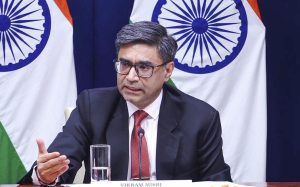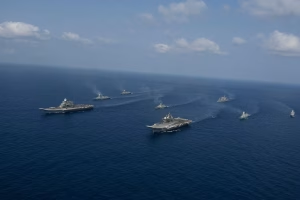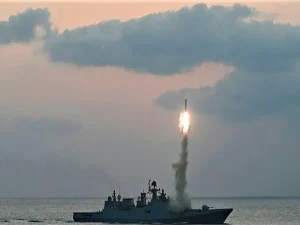New Delhi – In a significant escalation of the ongoing India Pakistan naval conflict, the Indian Navy has initiated targeted operations against multiple Pakistani targets in the Arabian Sea, according to defense sources early Friday morning. This military action comes in direct response to Pakistan’s attempted missile strikes in Jammu and Kashmir and drone incursions over various parts of India, including Rajasthan’s Jaisalmer region.
The current India Pakistan naval conflict marks a dangerous new phase in the deteriorating relations between the two nuclear-armed neighbors. Defense analysts note that naval engagements represent a concerning expansion of hostilities beyond the traditional flashpoints along the disputed border regions.
“The targeted operations in the Arabian Sea demonstrate India’s resolve to respond decisively to any threats to national security,” said a senior defense official who requested anonymity due to the sensitivity of ongoing operations.
Attempted Missile Strikes and Indian Air Defense Response
On Thursday, residents of Jammu reported hearing loud explosions across the city. Defense sources later confirmed that Pakistan had launched missiles targeting not only Jammu but several other locations in Jammu and Kashmir, including RS Pura, Arnia, Samba, and Hiranagar. The India Pakistan naval conflict escalated dramatically following these missile launches.

In what officials describe as a testament to India’s robust air defense capabilities, all incoming missiles were successfully intercepted. Artillery shelling was also reported near Pathankot, while drones were detected and neutralized over Jaisalmer and other locations.
As a precautionary measure in response to the heightened India Pakistan naval conflict, authorities enforced blackouts in several northern Indian cities, including Chandigarh, Mohali, and Srinagar. These measures were implemented to reduce potential targeting opportunities for aerial attacks.


India’s Ministry of Defence issued an official statement on the social media platform X (formerly Twitter): “Military stations at Jammu, Pathankot & Udhampur were targeted by Pakistani-origin drones and missiles along the International Border in J&K today. The threats were swiftly neutralized using kinetic and non-kinetic capabilities in line with established Standard Operating Procedures (SOPs). No casualties or material losses were reported.”
The statement further emphasized, “India remains fully prepared to defend its sovereignty and ensure the safety of its people,” highlighting the government’s position on the escalating India Pakistan naval conflict.
Chronology of Rapidly Escalating Tensions
The current phase of the India Pakistan naval conflict follows a series of rapidly escalating military actions between the two countries. The initial trigger appears to be last month’s terror attack in Pahalgam, which resulted in the deaths of 26 people. India has consistently maintained that Pakistan-based terror groups were responsible for orchestrating the attack.
In response to the Pahalgam attack, India launched “Operation Sindoor” on Wednesday, striking nine locations inside Pakistani territory. These targets reportedly included headquarters of designated terrorist organizations Lashkar-e-Taiba and Jaish-e-Mohammed in Muridke and Bahawalpur in Pakistan’s Punjab province.


Pakistan retaliated by attempting to target military installations across 15 locations in India. This prompted India’s armed forces to target Pakistan’s air defense systems on Thursday morning, with reports confirming the successful destruction of at least one system in Lahore.
The India Pakistan naval conflict further intensified Thursday evening when Pakistan launched missiles and drones toward Indian territory, all of which were neutralized by India’s air defense systems.
Diplomatic Statements and International Concern
As the India Pakistan naval conflict continues to escalate, diplomatic channels remain active. Foreign Secretary Vikram Misri emphasized that India’s military response has been “precise, measured and calibrated.” He rejected Pakistan’s claims of Indian escalation, stating that the original provocation came from Pakistan through the terror attack in Pahalgam.


“The original escalation was by Pakistan on the 22nd of April. We are the ones who are responding to that escalation with the action that was taken yesterday morning,” Misri stated. “And again, I would like to emphasize that the action was restrained — it was directed towards non-civilian, non-military targets and confined to terrorist camps.”
The Foreign Secretary added, “Any further action by Pakistan, some of which we are seeing today, is nothing but escalation by Pakistan now, once again, and will be responded to and is being responded to appropriately.”
International observers are closely monitoring the developing India Pakistan naval conflict, with several nations urging both countries to exercise restraint. The United Nations Security Council has called for an emergency session to address the rapidly deteriorating situation.
Military Expertise on the India Pakistan Naval Conflict
Defense experts analyzing the India Pakistan naval conflict note that naval operations represent a significant expansion of the conflict beyond traditional domains. The Arabian Sea is strategically important for both nations, with critical shipping lanes and energy supply routes passing through these waters.
“The India Pakistan naval conflict taking place in the Arabian Sea adds a complex maritime dimension to what has traditionally been a land-based confrontation,” explained Rear Admiral (Retd.) Sudhir Pillai, a naval strategy expert. “Naval engagements require sophisticated capabilities and present unique challenges compared to land operations.”
Military analysts suggest that the Indian Navy’s decision to launch operations in the Arabian Sea indicates a deliberate strategy to pressure Pakistan on multiple fronts. The Indian Navy maintains a considerable advantage in the region with its aircraft carrier, advanced submarines, and destroyer fleet.
Economic and Regional Implications
The escalating India Pakistan naval conflict raises significant concerns for regional stability and economic security. The Arabian Sea serves as a vital maritime corridor for global trade, with approximately 20% of the world’s maritime oil trade passing through these waters.
Financial markets across South Asia have already reacted negatively to news of the India Pakistan naval conflict, with stock exchanges in both countries recording sharp declines. International shipping companies are reportedly reviewing their routes and security protocols for vessels transiting the region.
Energy security experts warn that prolonged India Pakistan naval conflict could disrupt oil and gas shipments to multiple Asian economies, potentially triggering broader economic consequences beyond the immediate region.
Civilian Preparedness and Safety Measures
As the India Pakistan naval conflict intensifies, civil defense authorities in both countries have activated emergency protocols. In areas close to the international border, particularly in Punjab and Jammu & Kashmir, civilians have been advised to remain vigilant and follow official directives.

“We are monitoring the India Pakistan naval conflict closely and have implemented all necessary safety measures for coastal communities,” said a senior coast guard official from India’s western command. “Maritime security has been enhanced, and fishing activities are being regulated in sensitive areas.”
Final Word: Uncertain Path Forward
As night fell on Friday, the India Pakistan naval conflict showed no signs of de-escalation. Military operations in the Arabian Sea continue, with both nations maintaining high alert status across their armed forces.
The international community watches anxiously as two nuclear-armed neighbors engage in their most serious military confrontation in years. Diplomatic efforts to contain the India Pakistan naval conflict face significant challenges amid the rapidly evolving military situation.


What began with a terror attack has transformed into a multi-domain conflict with unpredictable trajectories. As military operations continue in the Arabian Sea, the need for measured responses and diplomatic engagement becomes increasingly urgent to prevent further escalation of the India Pakistan naval conflict.
Whether cooler heads will prevail remains to be seen, but analysts agree that the coming days will prove critical in determining whether the India Pakistan naval conflict can be contained or will expand further with potentially grave consequences for regional stability.

